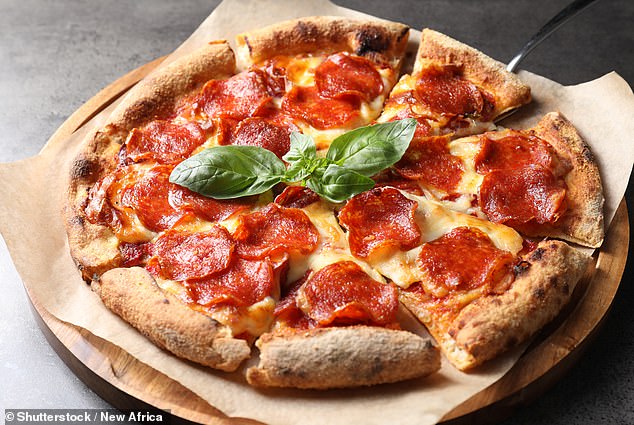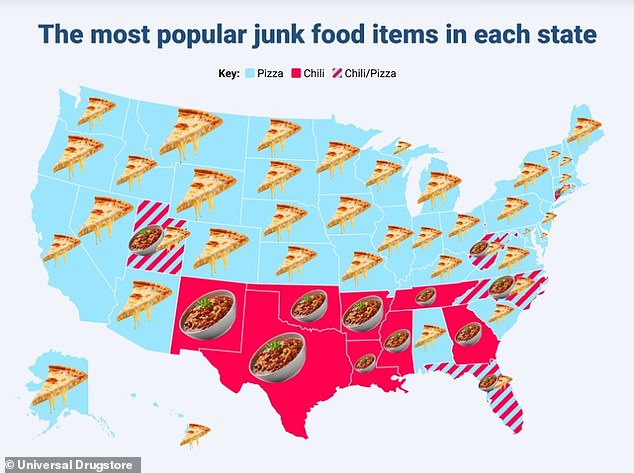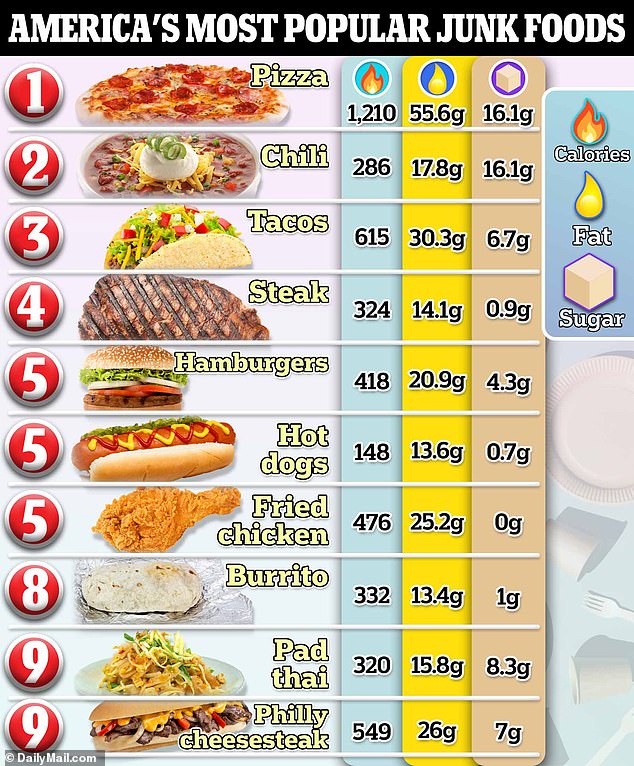America’s obsession with pizza could be fueling an obesity epidemic, a report suggests.
Medical experts at online drug marketplace Universal Drugstore analyzed data from surveys and Google searches to determine the most popular junk foods Americans like, adding up the average calories, fat and sugars of each to determine what the less healthy.
Pizza was considered the most popular, with an average of more than 6 million searches each month. However, it is loaded with 1,200 calories (half the recommended daily allowance) and 55 grams of fat (more than the recommended daily allowance).
Chili came in second in terms of popularity with 2.7 million searches, most of which came from southern states like Louisiana, Mississippi and Oklahoma, which have also seen the highest rates of obesity in the country.
This cold-weather staple had fewer calories than pizza, but more than a third of the recommended daily amount of fat.
The findings come as the obesity epidemic rises in the United States, with 40 percent of American adults qualifying as obese and one in 10 having a BMI over 40, according to the latest findings from the CDC.
A new report ranked the most popular junk foods in the United States and added up their average calories, fat and sugars.

According to research firm Universal Drugstore, pizza was considered the most popular junk food in the United States. However, it was also the least healthy food in the ranking.
But despite the grim statistics, the United States is far from the fattest country, with smaller nations like Tonga and Samoa topping the world rankings.
In the survey, tacos and steak ranked third and fourth, with 1.8 million and 550,000 searches each, respectively. Hamburgers, hot dogs and fried chicken tied for fifth place, containing between 150 and 500 calories per serving.
The rise in obesity could be due in part to the abundance of cheap, high-calorie foods like those commonly sought after, as well as large portions.
Dr Jamie Winn, pharmacist at Universal Drugstore, said: “We are lucky to have so many delicious food options at our fingertips that come from different cultures.” However, endless options can lead to overconsumption.
‘Excessive consumption, especially of high-calorie, low-nutrient foods, is one of the main causes of obesity, which occurs when more calories are consumed than expended.
“This can be worsened by excessive food intake and limited physical activity, which is a major public health problem due to obesity’s links to numerous chronic diseases, including diabetes, heart disease and various forms of cancer.” .
The team analyzed a survey from market research firm YouGov that asked Americans in 2024 about their favorite foods.
Using that list, Universal Drugstore evaluated the average number of annual searches from Google Ads Keyword Planner to create its list of the most popular dishes in the US.
From there, the researchers used the USDA’s FoodData Central database to determine the average calories, fat and sugars in each dish.
They also evaluated the states where the selected foods were the most popular.
While pizza was the most popular food, it was also the least healthy. According to the findings, the average frozen cheese pizza has 1,210 calories, more than half of the USDA’s recommended daily limit of 2,000.
However, that’s the total of an entire pizza, which is usually split between at least two people. One serving is just two slices. Since most pizzas have between eight and 10 slices, each slice would be approximately 120 to 150 calories.
Although it is the least healthy option, pizza reigned supreme in 37 states, including those with hot spots like New York City and Chicago, as well as Midwestern states that have average obesity rates between 30 and 40 percent. .

Researchers found that pizza was the most popular junk food in 34 states, with chili coming close in the southern US.
The pizza also contains 55 grams of fat. The Dietary Guidelines for Americans recommend that no more than 20 to 35 percent of your daily calories come from fat.
If you’re on a 2,000-calorie diet, for example, that’s about 20 to 30 grams per day.
However, the researchers did not specify how much of that fat is saturated, since it comes from foods such as butter, cheese and cream and has been linked to high cholesterol, diabetes and heart disease.
Pizza also contained the most sugar, with 16 grams per pie. This is about the same as five Chips Ahoy! cookies or one and a half Krispy Kreme classic glazed donuts.
The American Heart Association recommends no more than 24 grams of added sugar for women and 36 grams for men.
Chili came in second, with around 2.7 million monthly searches. One plate contains 286 calories.
That’s about the same as two slices of pizza, which would be between 240 and 300 calories. Chili also contains four grams of sugars and 18 grams of fat per serving.
Plus, the dish can quickly become less healthy if you top it with sour cream, cheese, or crackers.
With 1.8 million monthly searches, tacos were the third most popular food on the list. They had 615 calories per serving, along with 18 grams of fat and just four grams of sugar.
Steak, hamburgers and hot dogs rounded out the top five, ranging in size from 148 to 418 calories.
Fried chicken and burritos followed, ranging from 332 to 467 calories.
And tied for last place were the pad Thai and Philly cheesesteaks, which had 320 and 549 calories per serving, respectively.
Researchers used the findings to urge Americans to eat these foods in moderation to combat obesity and avoid excess calories, fats and sugars.
Dr Winn said: “A balanced diet is crucial to reducing the risks associated with obesity and overconsumption.” It involves eating a variety of foods in the right proportions, ensuring that people get enough of the nutrients needed for good health.’


